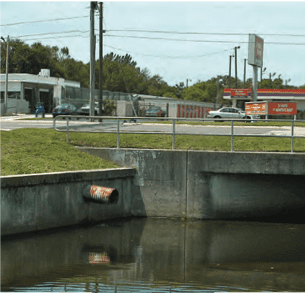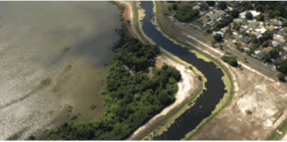Preventing Urban Pollution
Best Management Practices for Commercial and Industrial Businesses

Best Management Practices, or BMPs, are procedures that should be used to prevent pollutants, such as toxic chemicals, construction materials and detergents, from entering our storm drains and polluting our waterways.
- Consider simple solutions first, such as protecting the source of pollution by covering it from weather elements (wind, rain, etc).
- Seek less toxic alternative chemicals or processes that eliminate the need for chemicals.
- Clean up spills immediately using absorbent materials and properly dispose of used absorbents.
- Regularly sweep around the site but do not hose. Bag it, seal it and dispose of it!
- Train and educate your employees on urban runoff prevention, spill prevention and response.
- Never dispose wash water to the stormdrain system. Properly dispose of it in a sanitary sewer (utility sink, floor drain, or toilet).
- Have spill kits available.
- Use smaller containers for working with chemicals instead of a bulk container.
- Keep lids and bungs on all outdoor storage containers.
Facility
- Ensure stormwater collection systems are maintained and functioning as designed.
- Ensure cooling tower wastewater blown down does not enter surface water; it may contain metals and algaecides.
- Ensure all wastewater is plumbed to the sanitary sewer.
- Roof drains should not be plumbed directly to surface waters or county right-of-ways.
- Regularly inspect for leaks and clean equipment, vehicles and chemical storage areas.

Vehicle and Equipment Maintenance and Washing
- Use a drip-pan to collect fluids from leaking vehicles, equipment and storage containers. Repair leaks immediately.
- Store chemicals in a secondary container and out of the weather elements.
- If a commercial car wash is unavailable (commercial car washes drain into the sewer system and treatment plant), wash vehicles over gravel, dirt or grass to prevent runoff.
Waste Management
- Ensure oil and water separators are maintained and cleaned regularly.
- Ensure that garbage cans and dumpsters do not have any leaks and drain plugs are secure.
- Keep lids on dumpsters and trash cans.
Pollution Prevention
Streets and storm drains are part of the drainage system, which protects developed areas from flooding. Everything that enters the streets and storm drains flows directly into waterways without treatment and causes pollution. Disposing of wastewater, debris and toxic chemicals in the street or storm drain is prohibited by law.
Contact Information
- For hazardous waste handling and disposal, contact the Pinellas County Hazardous Waste Small Quantity Generator Program at (727) 464-7518.
- To report illegal dumping or for more information, call (727) 464-4425, Monday through Friday from 8 a.m. to 5 p.m.
- For questions on general waste disposal, contact Pinellas County Solid Waste at (727) 464-7500.
- For 24-hour voicemail (non-emergency spills only), call (727) 464-5060.
Pinellas County Stormwater Regulations
Pinellas County’s stormwater ordinance, Article VI, Chapter 58, is intended to protect the water quality and natural habitat of creeks, lakes and marine waters that receive discharges from our drainage system. The ordinance states that any discharge to the drainage system or to a waterway that is not composed entirely of stormwater is prohibited
This means that pollutants of any kind, including detergents and wastewater, organic compounds, oil, grease, metals, or bacteria and viruses may not enter the street, storm drain or gutter. Violators of the stormwater ordinance may be fined up to $10,000 per day, and payment for cleanup costs may be required.
More Information
For more information on what YOU can do to keep our waterways clean, our watersheds healthy or to report pollution, call the Watershed Management Hotline at (727) 464-4425 or email us at watershed@pinellas.gov.